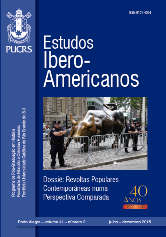The identity of Portugal and the political discourse of the radical right: from the multiracialism to the ethno-nationalism
DOI:
https://doi.org/10.15448/1980-864X.2015.2.21889Keywords:
Portugal, radical right, nationalism, Racism.Abstract
The identity of the radical right in the second post-war period is characterized by the milestone April 25th 1974. Before the Carnation Revolution, the radical right identified itself, although with a critical posture, with the nationalistic political culture of the authoritarian regime and, especially, with the multi-continental and multiracial dimensions of the myth of the Portuguese Empire. The end of the Empire caused by the overthrow of the authoritarian regime and the establishment of the democracy made the Portuguese radical right an antisystem actor, with a discourse that distances itself from the myth of Portugal “from Minho to East Timor” and gets closer to the identitarian and racialist discourse of the European and North-American far rights. This gradual transformation in the political culture of the radical right also coincides with a generational change in militancy in the last quarter of the 20th century and the dawn of the twentyfirst century. The paper analyzes the generational, organizational and ideological dynamics that characterised the radical right highlighting the political discourse of the nationalist groups founded during the Colonial War and the discourse of the most notorious radical group at the end of the Century: the National Action Movement (MAN).
Downloads
References
ANTONSICH, Marco. National identities in the age of globalisation: The case of Western Europe. National Identities, v. 11, n. 3, 281-299, 2009.
BARNES, Ian. Antisemitic Europe and the ‘Third Way’: The ideas of Maurice Bardeche. Patterns of Prejudice, v. 34, n. 2, 57-73, 2000.
BRITO, António José de. Nacionalismo ontem e hoje. In: AA.VV. (Ed.). Rumo ao futuro. Lisboa: Nova Arrancada, 2003. p. 27-50.
______. Para a compreensão do fascismo. Lisboa: Nova Arrancada, 1999.
______. O destino do nacionalismo português. Lisboa: Verbo, 1962.
BETZ, Hans-Georg. The growing threat of the radical right. In: MERKL, Peter H.; WEINBERG, Leonard (Orgs.). Right-Wing Extremism in the twenty-first century. Londres: Frank Cass, 2003. p. 74-93.
ELLINAS, Antonis. The media and the far right in Western Europe. Cambridge: Cambridge University Press, 2010.
GRIFFIN, Roger. From slime mould to rhizome: an introduction to the groupuscular right. Patterns of Prejudice, v. 37, n. 1, p. 25-50, 2003.
______. The incredible shrinking-ism: the survival of fascism in the post fascist era. Patterns of Prejudice, v. 36, n. 3, p. 3-8, 2002.
IGNAZI, Piero. The silent counter-revolution. Hypotheses on the emergence of extreme right-wing parties in Europe. European Journal of Political Research, v. 22, n. 1, p. 3-34, 2006.
______. Extreme Right Parties in Western Europe. Oxford: Oxford University Press, 2003.
JARDIM, Miguel. O nacionalismo do século XXI: rumos e soluções. In: AA.VV. (Ed.). Rumo ao futuro. Lisboa: Nova Arrancada, 2003. p. 117-120.
KAPLAN, Jeffrey; WEINBERG, Leonard. The emergence of a Euro- American radical right. London: Rutgers University Press, 1998.
MARCHI, Riccardo. A oposição de direita à política ultramarina de Marcelo Caetano. Lusíada, n. 7, p. 521-542, 2010.
______. Império Nação Revolução. As direitas radicais portuguesas no fim do Estado Novo 1959-1974. Alfragide: Texto, 2009.
MUDDE, Cas. The ideology of the extreme right. Manchester: Manchester University Press, 2000.
FURLOG, Paul. Social and political thought of Julius Evola. Oxon: Routledge, 2011.
SHEKHOVTSOV, Anton. European far-right music and its Enemies. London: Routledge, 2012.
SOBRAL, José Manuel. Dimensões étnicas e cívicas e glorificação do passado em representação da identidade nacional portuguesa numa perspectiva comparada. In: SOBRAL, José Manuel; VALA, Jorge. Identidade nacional, inclusão e exclusão social. Lisboa: Imprensa de Ciências Sociais, 2010. p. 81-110.
TAGUIEFF, Pierre-André. L’illusione populista. Milano: Mondadori, 2003.
TEIXEIRA, Nuno Severiano. Breve ensaio sobre a política externa portuguesa. Relações Internacionais, n. 28, p. 51-60, 2010.
ZÚQ UETE, José Pedro. A extrema-direita europeia e o Islão. Análise Social, v. XLVI, n. 201, p. 653-677, 2011.
Downloads
Published
How to Cite
Issue
Section
License
Copyright
The submission of originals to Estudos Ibero-Americanos implies the transfer by the authors of the right for publication. Authors retain copyright and grant the journal right of first publication. If the authors wish to include the same data into another publication, they must cite Estudos Ibero-Americanos as the site of original publication.
Creative Commons License
Except where otherwise specified, material published in this journal is licensed under a Creative Commons Attribution 4.0 International license, which allows unrestricted use, distribution and reproduction in any medium, provided the original publication is correctly cited.






